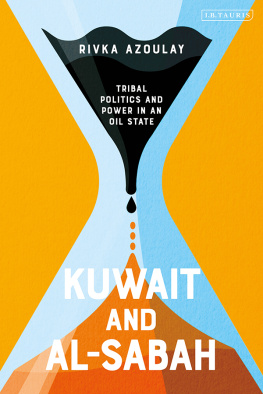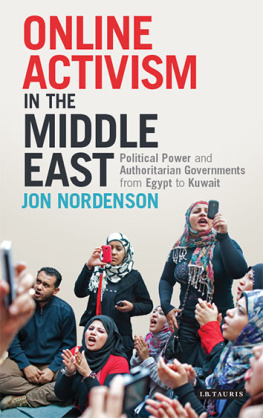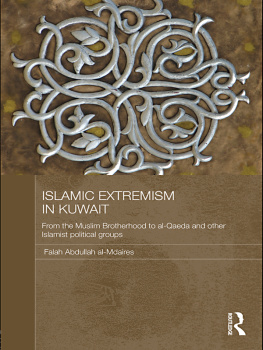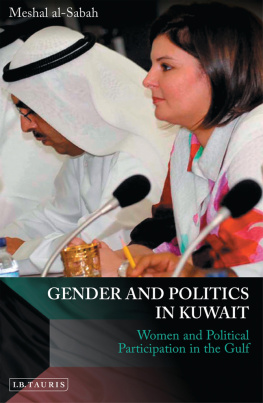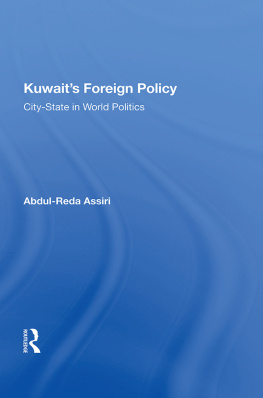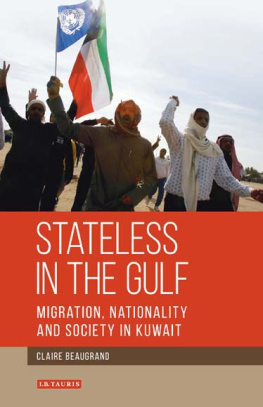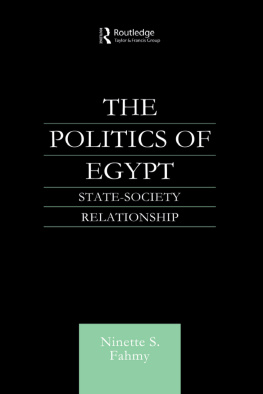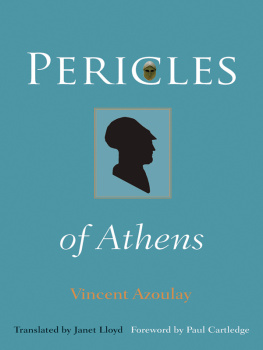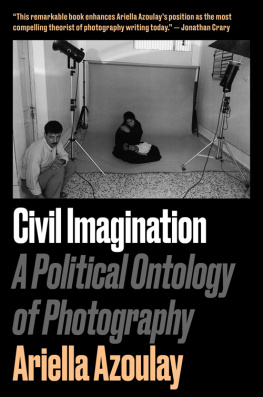The research for this book could not have been accomplished without the institutional and human support I received between 2009 and 2014 as a PhD student at Sciences Po Paris. The first two years were financed by the Kuwait Foundation for the Advancement of Sciences (KFAS) within the Middle East Mediterranean Chair at Sciences Po Paris; an intellectual powerhouse for students of the region that regrettably ceased to exist today.
In Kuwait I owe my debt to the Center for Gulf Studies at the American University of Kuwait (AUK) and to Farah al-Nakib, who ran the Center while I was there. The Center hosted me, provided me with accommodation and connected me with international scholars on the region with whom I could share my research thoughts. Farahs collegiality and great knowledge of Kuwaits history were invaluable during my stay in Kuwait between October 2012 and January 2014.
Apart from these institutions, great debt goes to my two PhD supervisors Gilles Kepel and Steffen Hertog who assisted me in this long journey and offered their support. Gilles Kepel accepted me in his programme in 2007 and had faith in me while I was still a young student without much knowledge of the Middle East and the Arabic language. I will never forget those years at Sciences Po and in beautiful Paris, where I matured as a person in a very stimulating environment. Steffen Hertog is another excellent scholar who has been able to successfully combine empirical work on the Arabian Gulf with theoretical contributions to the field of political economy. Steffen tirelessly continued to supervise my work and is an exemplary mentor.
Many other academics have been dear friends and supporters along the way. My gratitude goes to George Irani, professor at the AUK. George has been the one who pushed me in 2012 when I was already engaged in a full-time job with the ICRC to finish my PhD and get the ticket to be part of the Club at moments at which I was losing faith in the possibility of finishing. Mary Ann Tetrault was another academic of invaluable support. I have never been able to meet her in person and she sadly passed away just before I finished this book. I was introduced to Mary Ann in 2014 while in Washington DC. She was enthusiast about my work and it resulted in various calls and a series of email exchanges in which we talked more than academia. She has never been able to read the final draft, but I hope that this work will be a contribution to the field of Kuwait studies as she would have liked it to be.
Then there are my many friends who are also colleagues. In this regard, some deserve special mentioning. Many precious enduring friendships developed in Kuwait. Scott Weiner and Madeleine Wells are such dear friends who made me feel at home in Amman Street. The same holds for Claire Beaugrand and Zoltan Pall, whose friendship and intellectual support were crucial in the progression of this work.
Apart from these friends and colleagues, this study could not have been undertaken without the support and faith of the many Kuwaitis I interviewed since 2009, some of whom have become friends. Poet and scholar Muhammad al-Boghaili is a friend and offered his precious insights into Kuwait politics and Bedouin life at each moment I bothered him with my questions. Sami al-Khalidi has also been a great resource on Shia politics and has effortlessly helped me during my stay in Kuwait. Ahmad Bin Barjas historical knowledge of Bedouin life and Kuwait provided a crucial source for my historical chapters and I owe him many debts. He effortlessly gave me his time throughout these years to answer my burning questions about Kuwait and Bedouin life. Many friends also made me feel at home and showed me Kuwait from the inside. Imane al-Arbasch and Fatima Hammadi deserve to be mentioned specifically. Imane and Fatima made me discover Kuwaiti culture and the lives of Kuwaiti or better said Khaliji women.
I owe my gratitude to the editing board of Arabian Humanities and to my co-author Claire Beaugrand for allowing me to reproduce a large part of our previously published article in Part III of this book that deals with royal infighting and its impact on political life in Kuwait. The original article appeared under the title Limits of clientelism: elite struggles fragmenting politics in Kuwait, Arabian Humanities, Vol. 4 (2015). Being able to use this work was of great importance in developing the argument of this book.
I am similarly grateful to the editing board of Hurst Publishers for granting me permission to re-use many passages of my previously published chapter The Politics of Shii Merchants in Kuwait in Business Politics in the Middle East (eds. S. Hertog, G. Luciani and M. Valeri, London: Hurst, 2013).
This book could not have been produced without the support of Bloomsbury Publishing House. Lester Crook was the first to read my manuscript and his faith in this work was invaluable. Sophie Rudland deserves special mentioning. As senior editor she has been very helpful throughout the journey of publication. My special thanks go out to Gogulanathan and Viswasirasini of Integra Software Services for their tireless efforts in editing this book and preparing it for publication.
One cannot undertake a work of such magnitude without the support of ones family and loved ones. I owe my inspiration to them and they all know what they mean to me. This work is for them as well.
In the old order, the nobility lived on its estates.
In the new order, the state is the estate of the new nobility
This is a book that unravels, via a historical approach, the nature of political authority in Kuwaits Al-Sabah Emirate. It argues that todays politics and regimesociety relations are structured by a tribal authority system, in which the rulers co-opt groups at the periphery of power (in Kuwaits case the Shia minority and the badu) to counterbalance a powerful in-group Kuwaits merchants with whom the Al-Sabah historically shared power and kinship ties. This principle of rule has been described by late historian Ibn Khaldun (13321406) in his social history of Arabian dynasties and civilizations. In his Muqaddimah (Introduction), Ibn Khaldun argues that those who are capable of establishing dynasty are only those with tribal solidarity an esprit de corps (asabiyya in Arabic): social solidarity with lineage structuring power relations. According to his theory, rulers, once they have established themselves at the centre of power with the support of their own people, will rely on people outside the in-group, outside the inner asabiyya, because the real threat stems from this asabiyya that can always challenge the central elite status and seize power.
Asabiyya is a nebulous concept and can refer to different forms of social solidarity, depending upon social structures in a given society. In the case of Kuwait, this solidarity refers to kinship ties to the Bani Utub federation of founding families. It also refers to the traceability of ones lineage (nasab) to pure Arab tribes from Najd that were among the first families to settle in Al-Kout and because of this share an imagined identity of a diasporic community with its roots in Najd. Here both diasporic identity and the claim of purity of blood come together. Only this nucleus of old-settled Najdi merchant families some of them part of the Bani Utub found themselves on top of social and economic stratification in pre-oil Kuwait and today enjoy the privileges of having been granted exclusive prerogatives in the private sector as contractors and agents for foreign companies.

